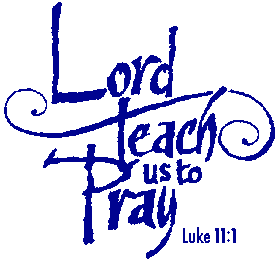 Readings: Gen 18:20-32; Col 2:12-14; Lk 11:1-13
Readings: Gen 18:20-32; Col 2:12-14; Lk 11:1-13I would suspect that one of the most repeated lines among Christian believers occurs in today’s gospel passage: "Lord, teach us to pray." Even we, men and women Benedictines in a consecrated way of life dedicated to prayer and work, we can so often say or think: "Lord, teach me to pray." Prayer has been a topic of intense interest among all Christian believers through the centuries. When I checked last week there were over 1750 books on prayer in the St. Meinrad Archabbey Library. It seems that we can’t get enough on prayer....although what we do get....never seems to satisfy.
That interest continues unabated right up to the present. Just this past week I received a copy of Explore, a quarterly periodical published by the University of Santa Clara in California. The whole issue is devoted to the topic of "Why Pray?" They asked several of their administrators and faculty to write short essays on the topic, "Why I Pray." Several of them are quite moving. Let me read you some passages from the contribution of Agnieska Winkler, one of the trustees of the university. "I pray because prayer connects me. Prayer connects me to the source of life, to the beginning and the end and everything in the middle. ... I pray out of a profound sense of gratitude—gratitude for a rich life of many blessings. ... I pray for others who may have not been so blessed. ... I pray because prayer brings me peace. ... I pray because it helps me be more generous. ... I pray for forgiveness. ... I pray for wisdom to make better decisions in both my personal and professional lives." (pp. 18-19)
But the essays don’t address the topic of how one prays. One writing on prayer that addresses that question directly is Urban Holmes III’s book, Spirituality for Ministry (1982). Urban Holmes was an Episcopal priest and theologian who was, in my judgment, one of the most perceptive writers on spirituality, ministry and pastoral theology in all the Christian churches. Tragically, he died at the age of 51 from a massive heart attack. His opening chapter of this book tries to detail what it means to be a "spiritual person." He defines spirituality as a particular type of relationship, a relationship that is open to transcendence, but within a community. A spiritual person is one who is open to accepting the reality and action of God in our world and who shares that in relationships with other people.
In his view prayer and spirituality are closely connected. Spirituality is the attitude lying behind prayer, and prayer is the open expression of spirituality. Holmes said it very well: "Prayer is an inner disposition toward the One who transcends all things, and prayer is the action this begets. We pray because we are spiritual beings. ... Prayer is the act of making whatever we do a cause for meeting and knowing God." (Pp. 19-20) The key here is recognizing that prayer is first of all a disposition of openness to One who is beyond, and not any specific action, like saying words or contemplating nature or playing some musical instrument. All of those things can be prayer, but the most important thing about prayer is that disposition of openness. And that can burst forth in a great variety of ways as the history of any major religious tradition shows.
When Jesus teaches his disciples to pray, he is in fact giving them the same kind of instructions.
"Father" - is an expression of openness to that Mystery which is beyond us
"hallowed be your name" - expresses the Holiness of the One who is beyond
"your Kingdom come" - I accept your providence and plan for my life and the world
"give us each day our daily bread" - You are the source of what we need and I am asking for this
"forgive us our sins" - I have failed and I ask pardon
"as we ourselves forgive everyone in debt to us" - I need to be accepting of others’ failures
"do not subject us to the final test" - Don’t let us be tempted beyond our means
We can still say all these prayers. Let’s remember that as we pray this Eucharist.
No comments:
Post a Comment